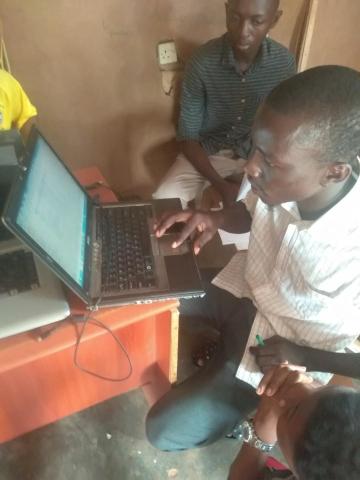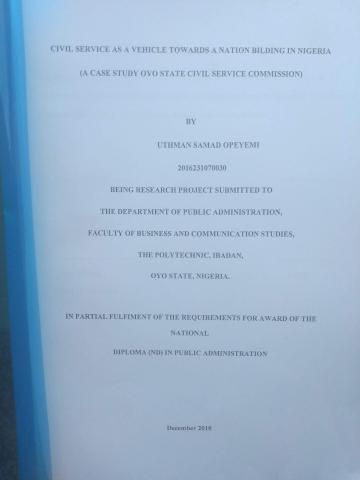
But at the Polytechnic Ibadan, this student-lecturer relationship is being traded for money. Here, final year students literally pay money into accounts of their supervisors and are allowed to duplicate other people’s work as their final year projects.

The first part of this undercover investigation exposed how students of The Polytechnic Ibadan are being extorted by the academic staff of the institution, how they systematically pay for grades and how students are made to pay for lecture notes by their lecturers.
In this second part, Uthman SAMAD reveals how lecturers at the foremost polytechnic in Southwestern Nigeria charge fees for supervising final year projects of students.
FINAL year project or thesis is a partial requirement for the award of university or polytechnic degree or higher diploma in Nigeria. It requires rigorous academic research by undergraduates under the supervision of a lecturer assigned as a supervisor.
Once a student is certified by his lecturer to have carried out satisfactory academic research on a given researchable topic, he is deemed to have fulfilled the partial requirement for graduation—the other requirements being his academic performance—and must be found worthy also in character.
But at the Polytechnic Ibadan, this student-lecturer relationship is being traded for money. Here, final year students literally pay money into accounts of their supervisors and are allowed to duplicate other people’s work as their final year projects.
Students, graduate narrate their ordeal with supervisors
When Taiwo (surname withheld) was assigned to be supervised by his Head of Department, Mr. Makinde for his final year project, the final year student had looked forward to a rigorous engagement with his supervisor.
Taiwo, then an undergraduate in the Marketing Department, submitted Chapters 1-3 to his supervisor, hoping that the experienced lecturer would look through his work, make corrections and put him through what to be done next.
He was wrong. Mr. Makinde instead asked him to part N40,000 and get a full score for the project rather than writing and submitting in chapters.
“I can literarily tell you that I didn’t do anything like I didn’t submit a word like this, this lecturer pressurised me and I paid 40K(N40,000) soft,” he said, recalling his encounter with the supervisor back in school.
“I was placed under Mr. Makinde who was then the HOD. I could remember that I have started writing my project before Baba said he did not need my project. I have written like three chapters and I took it to him,” Taiwo reminisced.
“Aranse, there is nothing I will do with this, or are you telling me you are brilliant? I am not using all these? Your own payment is N40, 000. I have marked enough of things like this,” the supervisor told him when he submitted the first three chapters.
With this reality staring him in the face—N40, 000 or no project and graduation—he went looking for the money.
“I went to Lagos to hustle for the 40k, I paid and that’s all,” he said.
Another student from the Department of Public Administration who spoke under anonymity narrated his ordeal with another lecturer at the institution, one Mr. Ganiyu Hakeem, who teaches Community Development and Public Finance. He also doubles as the staff adviser for the department.
“All is done and dusted now. Project is a means some lecturers use to fill their hungry stomachs,” he said.
“My case was an example,” he started. “Firstly, I was surprised when my supervisor asked me to pay a certain amount for the project because he believed I can’t do it alone.”
In this case, the supervisor was operating through a proxy—a cyber café operator was his agent.
“Although we didn’t pay to him directly but he directed us to a café man and we paid the money to him,” he recalled.
“I later heard that the café man will take half of my money and then give the commission to the supervisor which is half of the money I paid which was N20, 000.”
Another student of Public Administration who was supervised by the same Mr. Akeem recounted how hard it was to pass through a supervisor without paying.
“The first day we met him, he frankly told us to pay N30, 000 through a café man. It’s an individual project and not group, so everyone carried their burden. I heard later that he eventually pegged the amount to be paid at N20, 000 per student.”
I understood the meaning of the word ‘hard’, he said.
He would not attend to me daily for months, yet he gave priority and attention to those that made the payment.
“He asked those that were willing to pay to a café man beside the Music Department. So they just go there to collect the project and submit chapter-by-chapter.”
When contacted for comments through a telephone call, Mr. Ganiyu Akeem denied the allegation.
“There’s never been such since I have been working and I will never do that,” he responded angrily.
“The first part of your investigative report has caused a lot of trouble on this campus because I had this same information from somebody, I have been waiting for you till now.”
Livid with anger, he hurled abuses and curses on the reporter as a result of what he says were the bad consequences of the first part of this reporter’s expose.
“I have been issued queries because of this same issue. There’s no reason asking me about this again”
“If you don’t want to die untimely, leave me alone, don’t ask me anything about this again. This is no more a news. I don’t know anything about what you are talking about, I have never collected a dime from anybody,” he said and ended the call.
Akintunde, a graduate of Computer Engineering Department of the institution also shared his own story.
He painted a sorry picture of how he and three other members of the group were directed by their Electronic Package lecturer who was their final year supervisor to meet one of the café shop owners on the south campus market of the institution.
“I graduated last year, just a session ago. Our Electronic Package lecturer, Mr. Adebisi was our supervisor then and we were just four in number. We didn’t waste any time. He directed us to meet a café man at the South campus market to get a project done,” Akintunde narrated.
“The project was about ‘gas leak detector’, so the man did the hardest part of it which is hardware building, and he collected N40, 000.
The student said the sum was shared by the four of them at N10,000 each. We later wrote the write-up on the hardware ourselves.”
In another interview, Mr. Adebisi of the Department of Engineering also denied the allegation levelled against him.
He said :“ I don’t understand what you are talking about. We don’t give projects to students. I don’t know any café around Music Department, and I don’t collect money from any student, so I don’t understand what you are talking about.”
All efforts to reach Mr. Makinde of the Marketing Department proofed abortive as his number was not reachable throughout the period of filing this investigation.
Welcome to Kalkulus Concept where final projects are for sale

There are quite a number of business centres on the campus of The Polytechnic Ibadan, where final year projects are plagiarised and sold to students who could not do projects on their own. Investigations also revealed that the operators of the centres work with lecturers of the institutions who serve as project supervisors to the final year students.
Kalkulus Concept is one of such centres where anyone can walk in and get a copy of final year of any department purchased. It is located in small settlement opposite the Department of Survey and Geo-informatics. The settlement itself is populated with computer business centers and canteens.
A visitor is attracted to the businesses going on there by series of advertisements and marketing strategies—oral jingles like “brother, Photocopy dey o, Brother spiral binding wa o—were some of their marketing lines.
Kalkulus Concept also solicit students who want their research project to be done by a proxy.
“Are you a final year student or a researcher? Contact Kalkulus for researchable project topics, seminar topics/writing, project materials and Data analysis,” a part of the banner reads.
A fair complexioned man with an average height who would later identify himself as Qudus welcomed this reporter to the center.
“Good morning sir, we can give you whatever you want here sir” Qudus said with vivacity of a problem solver.
“I want to get a finished project from the Department of Public Administration,” the reporter said plainly.
“You know this is first semester, I should have finished by now but the fact is I am working and schooling, I don’t really have much time. I have been told by many students of my department that you be guru for this kind matter; just help me with this thing, any amount I will pay”
Convinced by the apologetic nature of this reporter’s request, Qudus smiled, assured him to worry less that he was at the right place. He even boasted of the centre’s popularity. Below is the conversation between Qudus and this reporter.

Qudus: What is the name of your supervisor?
Reporter: (without much ado) Mr. Ganiyu Akeem.
Mr. Ganiyu Akeem, a known lecturer in the department, has a track record of asking his students to pay him before being supervised for their final year project.
Kudus: Kosi wahala (no problem), Ganiyu is a person that has his own people that works for him here.
Reporter: I know him
Qudus: So you know him? You know that’s it? (Qudus raising an eyebrow for confirmation)
Reporter: Yes now
Qudus: (relaxing) I can understand, Ganiyu, Ganiyu, ah ah ah, no problem.
So how do we go about it?
Reporter: Do you have anyone (finished project) that was once supervised by Ganiyu Akeem?
Qudus: Ha ha, any project that you want, we will just change the name and that is all. We will just have to collate the chapters, because it is on the laptop.
Reporter: Okay then
Qudus: When do you want to submit it?
Reporter: If possible as we are talking right now
Qudus: You cannot have it today, or wait let me help you to ask
Reporter: Just make it ‘coded’ sir
Qudus: No problem, don’t worry.
Qudus went inside the shop without hesitation to open a file of portable device format (PDF) of a finished project done by them (Kalkulus concept) on his computer. He checked to realise that some chapters of the project to be sold to this reporter were missing.
Qudus called Quadri, a senior colleague at the center who is also a student of the institution for the missing part. In less than 15 minutes, this reporter was introduced to Quadri, who sounded to have full knowledge of the reporter’s ‘problem’.
“I have the files ready, let’s talk about the money” Quadri said with a face of a busy businessman.
Reporter: how much is it?
Quadri: It Is N15, 000
“Let me pay N5000k sir. You can see, it’s already late for this submission, just help me” this reporter said apologetically.
Quadri accepted the offer and asked for the transfer of the N5, 000 to his Guaranty Trust bank account with account number 0162168898 and Adeyemi Damola Quadri as the name which authenticates the account. The transfer was made immediately without hesitation.

After acknowledging the receipt of the N5, 000 transfer, Quadri surfed through his laptop computer to look for an already done and submitted project in the acclaimed department of this reporter.
At the end, he came up with a project submitted by one Tajudeen, on the topic: “Civil Service As a Vehicle Towards A Nation Building In Nigeria (A Case Study Oyo State Civil Service Commission)”.

Quadri began to work on the project. After 20minutes or so, the modification was complete and was the reporter was handed ‘his’ final year project which contained a review of literature, analysis of sourced data and others.
The name of the supervisor, matriculation number of the student and date of submission were cleared off and replaced with those presented by this reporter.
Part-time students also not spared
The practice of asking students to pay for their final year project by their lecturers who serve as supervisors also affects students in part-time programmes.
Muhammed, a student of Mass Communication graduate explained that he and his course mates did not even attempt to write any project. Rather, they paid a certain amount of money to their supervisor and they graduated.
“During our time, that was a session ago, we didn’t do any written project like full-time students,” Mohammed recalled.
“We were asked by our supervisor, Mr. Olawale Olagoke who teaches Graphics of Communication to contribute N5, 000 each. We were more than 114 students then. The money was used to make a SAV banner and we were just given a technical report at the end that we just submitted”.
Also, a current ND11 female Daily Part-time (DPP) student, Omolola (not real name though) of Mass Communication Department also revealed that part-time students in her department have been grouped and were asked before the end of their last examination (first semester) to pay a sum of N1, 000 each under the supervision of one Mr. Najimdeen Adunola who teaches Advert related courses.
“I am grouped under Mr. Najimdeen Adunola and we have been asked to pay N1, 000 each,” Omolola noted.
What the law says about stealing of intellectual property
Davidson Oturu in “An Overview of Copyright Protection in Nigeria, explains that Copyright is a form of intellectual property.
It has been defined by Black’s Law Dictionary, 9th Edition as a right granted to the author or originator of certain literary or artistic productions, whereby the creator is invested, for a limited period, with the sole and exclusive privilege of multiplying copies of the literary or artistic works and publishing or selling them, Oturu further explained.
He said the Copyright Act Chapter C28 Laws of the Federation of Nigeria 2004 (Copyright Act) does not define the word “works”. But quoting Section 1 (1) of the Copyright Act, Oturu said the Act provides that the following shall be eligible for protection: Literary works, Musical works, Artistic works, Cinematographic films, Sound recordings and broadcasts.
Any work that is created which does not fall under the foregoing categorisation cannot vest copyright in its creator. Furthermore, it is not sufficient to have created a work; such work will only be eligible for legal protection if: “(a) Sufficient effort has been expended on making the work to give it an original character; (b) The work has been fixed in any definite medium of expression now known or later to be developed, from which it can be perceived, reproduced or otherwise communicated either directly or with the aid of any machine or device.”
He concluded that it can be gleaned from the above statutory provision that the moment a literary, musical or artistic work has been fixed in a definitive form and effort has been expended on the work to give it an original character, it qualifies as a work eligible for protection.
“Originality within this context does not connote inventiveness or novelty. It simply denotes that the work was not copied or plagiarised. It is therefore pertinent to note that copyright does not protect ideas and copyright is acquired by expending skills on a work and not by invention,” he added.
Also, a Lagos based lawyer, Abimbola Ojenike, posited that the case of intellectual property theft can be viewed from civil and criminal perspectives of which any of these perspectives can be referenced to indict defaulters.
“If I submit my project to Obafemi Awolowo University or the University of Ibadan, I am submitting it for the purpose of assessment not an assignment of role to anyone, Ojenike said.
“Whoever the lecturer is selling it to or through a proxy, it’s unlawful, it is even more unlawful because the students are dealing with a third party who basically gets access to university’s archive and reproducing it.
“It depends on how you are looking at it. You can view it from civil Law perspective and you can look at it within the criminal context.
“Criminal context will be that academic dishonesty, the bribery that goes on between one person and the other, a kind of fraudulent transaction between a lecturer and a computer center worker to sell final year project, there’s nothing like intellectual property here, it is a general criminal law that applies to that.
“The owner of the work has the civil right to sue for intellectual property infringement which will result in compensation.”
ASUP speaks
The Academic Staff Union of Polytechnic (ASUP), The Polytechnic Ibadan branch has been suspended by the management couple of sessions ago due to internal fracas, but a former deputy chairman of the union, Asiwaju Akinade expressed surprise at the development when this reporter spoke to him.
He insists such practice never existed on the campuses of the institution.
“What’s the meaning of that? Akinade queried in surprise, and added, “ I know quite a number of students that haven’t paid their school fee talk less of paying N20, 000 for the project.” “I know them; their parents can’t even afford it.”
As far as he is concerned, no lecturer is engaging in the sale of projects or collecting money from students to supervise them for their final year project. “As I have said, if you know of any frivolous activities, contact the right quarters and I am very sure that does not exist here,” he with an aura of certainty.
Students have the right to report wrongdoings by lecturers—Management
When contacted, Soladoye Adewole, Public Relations Officer of the polytechnic exonerated the management of the institution from the ‘final year project businesses, which he described as ‘satanic’. He, however, didn’t deny or confirm the existence of the practice.
“That is satanic conspiracy,” Adewole said. “It is academic fraud,” he added, because according to him, “the students too are willing too (to pay) as they are criminally minded.”
“If it happens as you said, that means the student is just a lazy bone.”
The polytechnic spokesperson maintains that students have the right to report to the management of the institution if they were coerced by any lecturer to do anything against the law or against their wish.
“You are once a student too, did our Vice-Chancellor know about your final year project? You have every right to report any moves by any lecturer to the management,” he said.
An ignorant students’ union government
Akadiri Bayonle, the polytechnic’s Students’ Union Government (SUG) president claimed he was not aware of such unwholesome practice in the institution. This, according to him has never been reported to the union nor has he ever heard of it in the institution.
“You know, I have not written any project before on this campus due to the fact that I didn’t have my National diploma here,” Bayonle said proving his ignorance of the project sale business. “I can tell you officially that we don’t pay as to the information I got. I have even never heard of it.”
He said there are 32 departments in the institution with more 28 presidents of departmental associations.
“I can’t force information out of their mouth and I can tell you as the president of the union, I am personally working to stop all extortion,”Bayonle said.
“You know the funny thing is, we students are even the one extorting ourselves, the SUG sometimes made a move that no association should pay more than a thousand naira, the rule stands, we will proclaim this over extortion and I can tell if truly this is happening, it will be a thing of the past”
What fact sheets say on Nigerian lecturers
A research conducted in all 36 states and the Federal Capital Territory (FCT) between April and May 2016 by United Nations Office on Drugs and Crime (UNODC) in collaboration with the National Bureau Statistics (NBS), published in July 2017, shows that teachers/lecturers are one of the corrupt officials in the country.
Teachers/lecturers were ranked13th out of 18 corruption marked officials in the country with a prevalence rate of 11.7 per cent.
The 2019 Global Corruption Barometer Africa in her latest release also made it clear that in 2015, 25 per cent of total bribery cases was from public schools while in 2019, the prevalence shifted higher to 32 per cent.
Fight against corruption should start from tertiary institutions—Activists
Hamzat Lawal, activist and founder of Connected Development (CODE) while reacting to the level of corruption in Nigeria’s higher institution of learning, recommended that fight against graft should start from tertiary institutions.
“Corruption has eaten deep and particularly into our higher institution of learning,” Lawal said.
He said Nigeria has huge number of her citizens living in poverty who still struggle to send their wards to school, particularly public institutions.
“I can imagine what the parents are going through directly or indirectly to pay a corrupt lecturer before they get their project done,” he said.